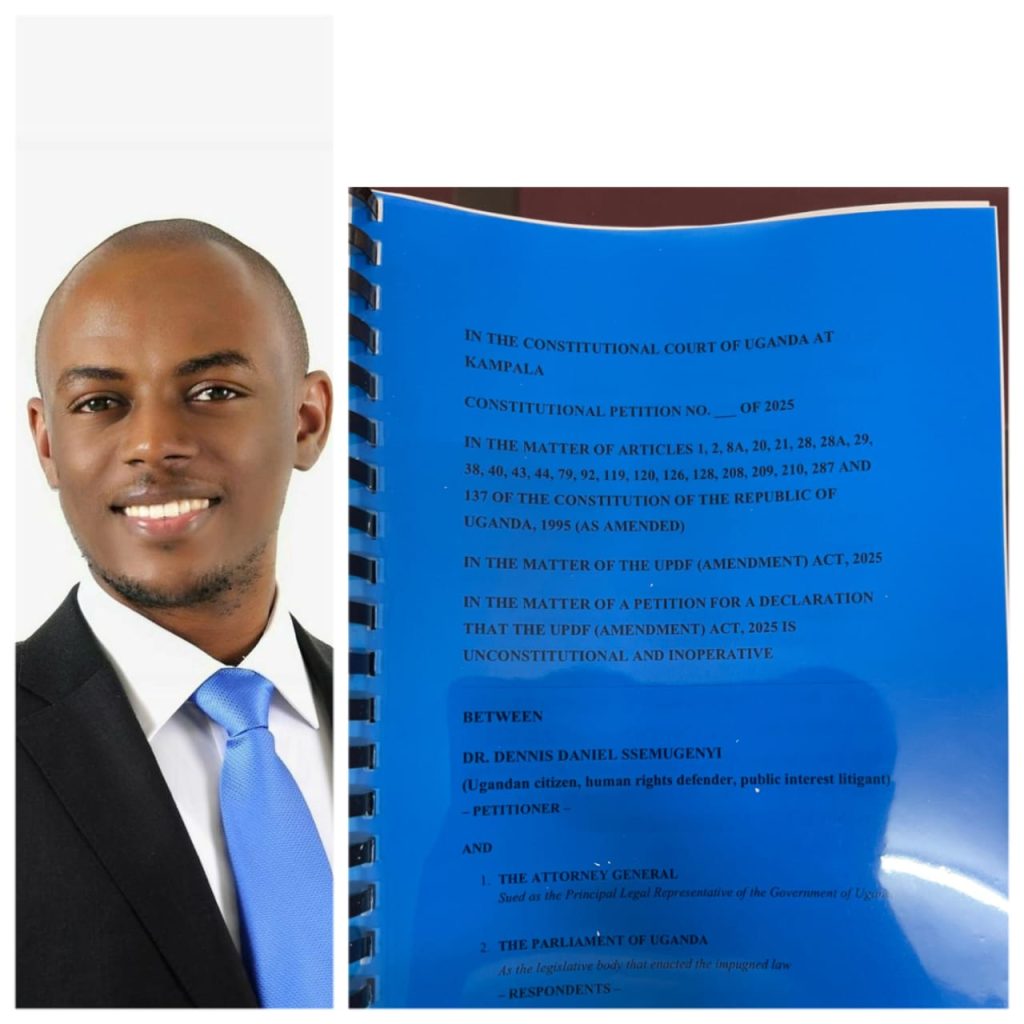In a significant development, Dr. Dennis Daniel Ssemugenyi who describes himself as a human rights defender and public interest advocate, has filed a constitutional petition before the Constitutional Court of Uganda, challenging the recently enacted UPDF (Amendment) Act, 2025.
The petition alleges that the Act is void ab initio due to its violation of key constitutional principles.
The UPDF (Amendment) Act, 2025 has been at the center of controversy since its passage. The law allows military courts to try civilians, which the petitioner argues is a breach of the Constitution’s guarantee of a fair hearing before an independent and impartial civilian court.
Additionally, the law’s passage has raised questions about the balance of power between the military and civilian institutions in Uganda.
The Attorney General (sued as the principal legal representative of the government of Uganda and parliament (sued as the legislative body which enacted the impugned act) are the defendants.
Dr. Ssemugenyi’s petition contends that the UPDF (Amendment) Act, 2025 offends the Constitution in multiple ways.
Firstly, it argues that the law’s provision allowing military trials of civilians violates Articles 28(1) which guarantees a fair hearing before an independent and impartial civilian court , 44(c) which makes the right to a fair hearing non-derogable, and 119, 120, and 126 which protects prosecutorial and judicial independence of the constitution.
He adds that the act attempts to undo previous Supreme Court rulings, undermine the separation of powers under Articles 28, 126, and 128.
Furthermore, the petition highlights the issue of electoral malapportionment, arguing that the law was passed by a parliament that does not proportionately represent the Ugandan population, contrary to Article 63(3), which requires that, “each constituency shall contain as nearly as possible an equal number of inhabitants” with the number not exceeding or falling below the national average by more than 15%.
“It was passed in a context where constituency representation in Parliament is deeply imbalanced, and a gerrymandered electoral system has produced a two-thirds ruling party supermajority, despite significant population disparities. I believe that such a law, passed under these conditions, cannot reflect the sovereign will of the Ugandan people,” he argues.
According to Dr. Ssemugenyi, basing on the constitution, each constituency should have roughly equal numbers of inhabitants. However, he says significant disparities exist, with some constituencies having as few as 59,000 people while others have over 150,000.
“Based on Uganda’s projected 2025 population of 51.4 million and 353 constituencies, the national quota is approximately 70,000 people per MP. However, some ruling party MPs represent constituencies with as few as 59,000 people-that’s 15.7% deviation. Many Opposition MPs represent constituencies exceeding 150,000 people-that’s a +114% deviation,” he observes.
Ssemugenyi contends that these imbalances undermine the principle of equal suffrage and result in an artificial supermajority that facilitates the passage of contested legislation.
“Even with presidential assent, a law that contradicts the constitution remains subject to judicial review. Constitutional supremacy cannot be set aside by political convenience,” he stresses.
He now wants court to declare the UPDF (Amendment) Act, 2025 unconstitutional and void ab initio; recognize that the current constituency framework does not reflect the general will of the people; reinforce the constitutional protection that military courts should not try civilians; and encourage the development of electoral and legislative reforms that honour the principles of equal representation and civilian rule.
“This is not a protest — it is a patriotic duty. A quiet but firm stand for the constitution, for justice, and for the Ugandan spirit of fairness. This is what the petition stands for. And it is what I, too, stand for — a Uganda where law, liberty, and leadership walk hand in hand,” Dr. Ssemugenyi, stated in a press release shortly after filing the petition.
The case is expected to have significant implications for Uganda’s democracy and the rule of law.
“The outcome of this petition will have far-reaching implications for Uganda’s democracy, human rights, and the rule of law. As the court deliberates on this matter, it is essential to consider the principles of constitutional supremacy, judicial independence, and the protection of human rights,” Dr. Ssemugenyi pointed out.
The Constitutional Court will now review the petition and determine whether the UPDF (Amendment) Act, 2025 is indeed constitutional. The outcome of this case will be closely watched by Ugandans and international observers alike.

